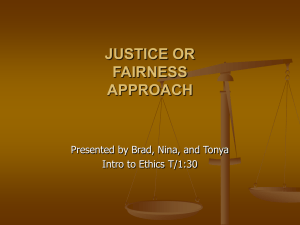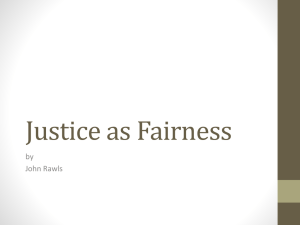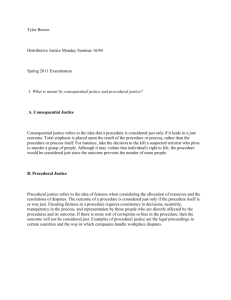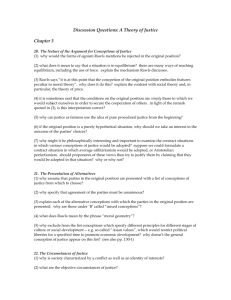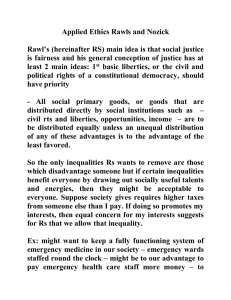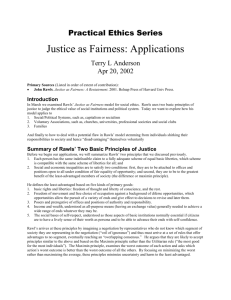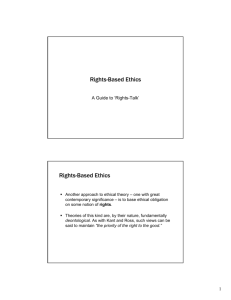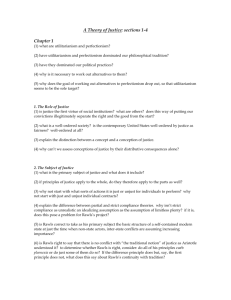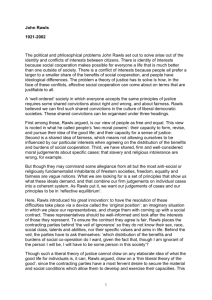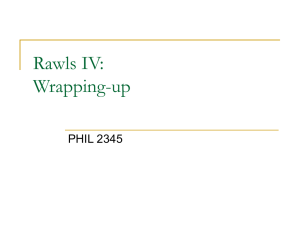ii. justice: ethical, social, political
advertisement
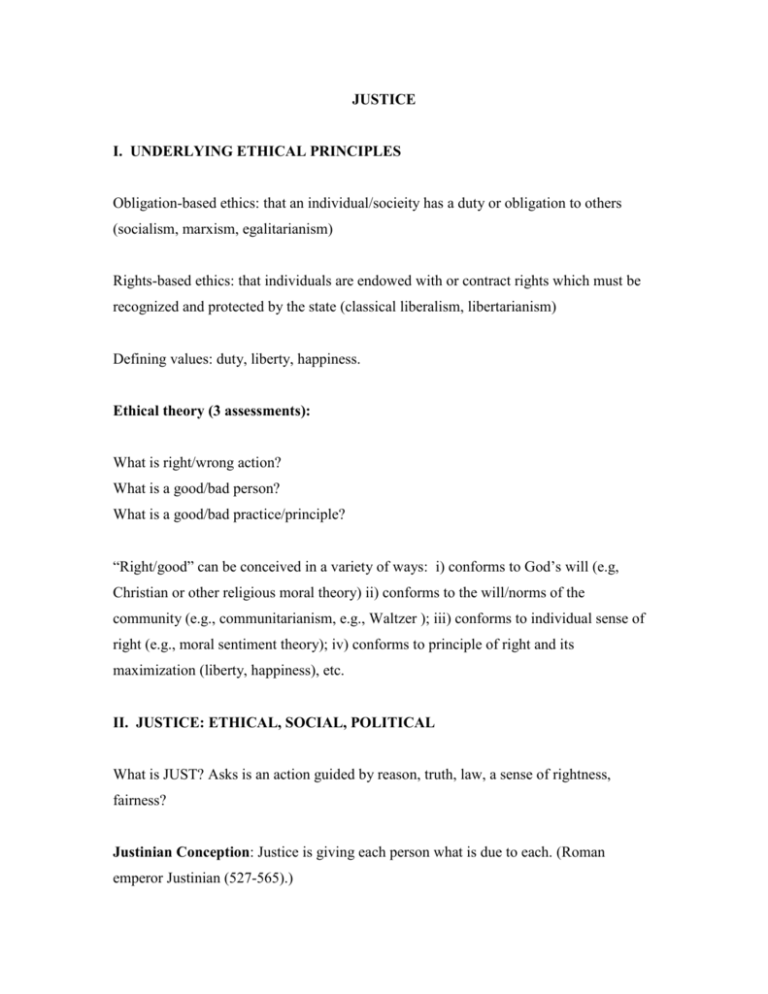
JUSTICE I. UNDERLYING ETHICAL PRINCIPLES Obligation-based ethics: that an individual/socieity has a duty or obligation to others (socialism, marxism, egalitarianism) Rights-based ethics: that individuals are endowed with or contract rights which must be recognized and protected by the state (classical liberalism, libertarianism) Defining values: duty, liberty, happiness. Ethical theory (3 assessments): What is right/wrong action? What is a good/bad person? What is a good/bad practice/principle? “Right/good” can be conceived in a variety of ways: i) conforms to God’s will (e.g, Christian or other religious moral theory) ii) conforms to the will/norms of the community (e.g., communitarianism, e.g., Waltzer ); iii) conforms to individual sense of right (e.g., moral sentiment theory); iv) conforms to principle of right and its maximization (liberty, happiness), etc. II. JUSTICE: ETHICAL, SOCIAL, POLITICAL What is JUST? Asks is an action guided by reason, truth, law, a sense of rightness, fairness? Justinian Conception: Justice is giving each person what is due to each. (Roman emperor Justinian (527-565).) 2 Does giving what is due include moral, judicial, and social goods? The latter (SOCIAL GOODS—introduced by Jean last week) includes questions of economic and resource allocation. Social/distributive justice: Rawls The most widely discussed theory of distributive justice in the past three decades has been that proposed by John Rawls in A Theory of Justice, (Rawls 1971), and Political Liberalism, (Rawls 1993), Justice as Fairness (Rawls, 2001). Thesis: Justice is fairness 4 main features of Rawl’s account of Justice as Fairness: The original position; equality principle, difference principle Feature One: The Original Position: proposes that the best way to find fair practices is to impose the veil of ignorance. This is not unlike the mechanism of Kant’s categorical imperative: "Act only according to that maxim by which you can at the same time will that it should become a universal law." Abstracts away from particulars that can reduce objectivity, impartiality: office, race, class, etc. Veil of Ignorance: Imagine that you have set for yourself the task of developing a totally new social contract for today's society. How could you do so fairly? Although you could never actually eliminate all of your personal biases and prejudices, you would need to take steps at least to minimize them. Rawls suggests that you imagine yourself in an original position behind a veil of ignorance . Behind this veil, you know nothing of yourself and your natural abilities, or your position in society. You know nothing of your sex, race, nationality, or individual tastes. Behind such a veil of ignorance all individuals are simply specified as rational, free, and morally equal 3 beings. You do know that in the "real world", however, there will be a wide variety in the natural distribution of natural assets and abilities, and that there will be differences of sex, race, and culture that will distinguish groups of people from each other. In this original position, behind the veil of ignorance, what will the rational choice be for fundamental principles of society? The only safe principles will be fair principles, for you do not know whether you would suffer or benefit from the structure of any biased institutions. Indeed the safest principles will provide for the highest minimum standards of justice in the projected society. Feature 2 Social Contract: fairness makes right dealing possible; people enter into an implicit contract when they agree to play by the rules [e.g. taxation] Features 3&4 Equality and Difference 1.EQUALITY PRINCIPLE: Each person has an equal claim to a fully adequate scheme of equal basic rights and liberties, which scheme is compatible with the same scheme for all; and in this scheme the equal political liberties, and only those liberties, are to be guaranteed their fair value. 2. DIFFERENCE PRINCIPLE: Social and economic inequalities are to satisfy two conditions: (a) They are to be attached to positions and offices open to all under conditions of fair equality of opportunity; and (b), they are to be to the greatest benefit of the least advantaged members of society. (Rawls 1993, pp. 5-6. The principles are numbered as they were in Rawls' original A Theory of Justice.) THREE OBJECTIONS TO THE DIFFERENCE PRINCIPLE Egalitarian objection: inequalities permitted by the Difference Principle are unacceptable even if they do benefit the least advantaged. 4 Utilitarian objection: the Difference Principle does not maximize utility. In A Theory of Justice, Rawls uses Utilitarianism as the main theory for comparison with his own, and hence he responds at length to this Utilitarian objection and argues for his own theory in preference to Utilitarianism [Rawls rejoinder: case of slavery] Libertarian objection: the Difference Principle involves unacceptable infringements on liberty. For instance, the Difference Principle may require redistributive taxation to the poor, and Libertarians commonly object that such taxation involves the immoral taking of just holdings. (see Libertarian Principles) III. POSSIBILITY OF GLOBAL JUSTICE: Unanswered in Rawls. PETER SINGER: the only way this will become a reality is if we develop a suitable form of government for our single world; a daunting moral and intellectual challenge O’NEILL’S DEFENCE OF COSMOPOLITAN JUSTICE -2000 book on justice Bounds of Justice (2000) In this collection of essays, Onora O'Neill argues for an account of justice that is fundamentally cosmopolitan rather than civic, yet takes serious account of institutions and boundaries, and of human diversity and vulnerability. She explores the question of whether the claims and scope of justice are limited by culturally or politically specific concepts and views, and examines the demands and scope of just institutions and the possibility of a world with porous boundaries and dispersed power. In her paper she considers and rejects the conclusion that justice requires the construction of a world state. [how prevent degeneration into global tyranny and injustice] Proposes: Plural agents of justice (not a single entity or strategy) 5 Primary agents: have power, some form of coercion to partially control the action of other agents and agencies Secondary agents: contribute to justice by meeting the demands of primary agents E.g., Universal Declaration of Human Rights approaches justice by proclaiming rights; says very little about which agents and agencies must do to secure these rights. UDHR does view states as the primary agents of justice; so it has universal view of rights and a status view of obligations E.g., John Rawl’s justice as fairness: hidden statism
